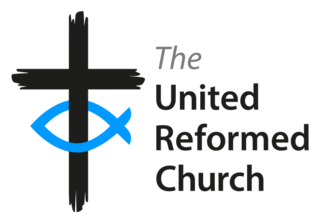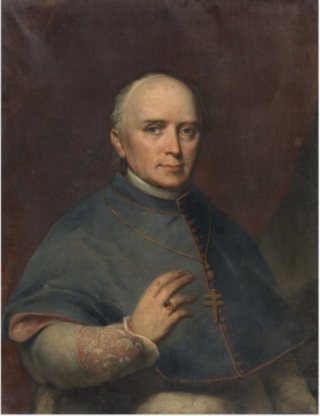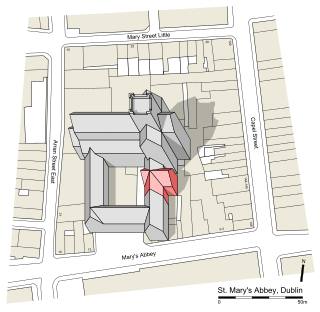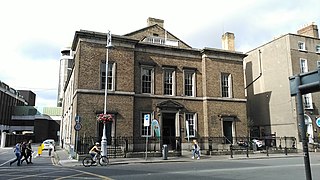Irish Evangelical Society (IES), was an organisation founded in 1814 to promote the Protestant faith in Ireland. [1] It was initially founded in London. Its aim was to support preachers and priests of the Reformed faith outside the established Church of Ireland. It was supported by a number of Evangelical members of the Church of Ireland, as well as members of the society in England. As a result, it supported Independent Ministers, priests and Chapels. [2] It became closely aligned to the Congregationalists, and was pretty much absorbed by Congregational Union of Ireland by 1899.
It was often at odds with the London-based organisation supporting evangelisation in Ireland and it.
The IES founded an academy for the training of ministers, in Manor Street, Dublin, this academy was dissolved in 1828.
Churches in Dublin it supported included York Street, Plunket Street Meeting House, and Zion Chapel, Kings Inns Street.
Rev. William Cooper served as secretary, Rev. Dr. William Ulrick (York Street Church.), James Clarke, and Rev. David Stuart (New Marys Abbey) were involved in the society.

The United Reformed Church (URC) is a Protestant Christian church in the United Kingdom. As of 2024 it had approximately 44,000 members in around 1,250 congregations with 334 stipendiary ministers.

Congregationalism is a Reformed (Calvinist) tradition of Protestant Christianity in which churches practice congregational government. Each congregation independently and autonomously runs its own affairs. These principles are enshrined in the Cambridge Platform (1648) and the Savoy Declaration (1658), Congregationalist confessions of faith. The Congregationalist Churches are a continuity of the theological tradition upheld by the Puritans. Their genesis was through the work of Congregationalist divines Robert Browne, Henry Barrowe, and John Greenwood.
The Irish Church Missions (ICM) is a conservative and semi-autonomous Anglican mission. It was founded in 1849 as The Irish Church Missions to the Roman Catholics chiefly by English Anglicans though with the backing and support of Church of Ireland clergy and bishops, with the aim of converting the Roman Catholics of Ireland to Protestantism. The reference to Roman Catholics in the title was removed in 2001.

The London Missionary Society was an interdenominational evangelical missionary society formed in England in 1795 at the instigation of Welsh Congregationalist minister Edward Williams. It was largely Reformed in outlook, with Congregational missions in Oceania, Africa, and the Americas, although there were also Presbyterians, Methodists, Baptists, and various other Protestants involved. It now forms part of the Council for World Mission.
Thomas Wilson was a Congregational benefactor of chapels and educational institutions and founder member of the Council of University College London from 1825.

Daniel Murray was an Irish Catholic prelate who served as Archbishop of Dublin from 1832 until his death.

St. Mary's Abbey was a former Cistercian abbey located near the junction of Abbey Street and Capel Street in Dublin, Ireland. Its territory stretched from the district known as Oxmanstown down along the River Liffey until it met the sea. It also owned large estates in other parts of Ireland. It was one of several liberties that existed in Dublin since the arrival of the Anglo-Normans in the 12th century, which gave it jurisdiction over its lands.
Joseph Henderson Singer (1786–1866) was an Irish Anglican bishop in the Church of Ireland in the 19th century.
The Caleb Foundation, created in 1998, is a creationist pressure group in Northern Ireland. It also lobbies on a range of social policy issues such as abortion and same-sex marriage from an evangelical Protestant perspective, and has been particularly influential with Democratic Unionist Party ministers in the Northern Ireland Executive. The organisation has described its mission as "promoting the fundamentals of the historic evangelical Protestant faith".

Thomas Scales (1786–1860) was a leading British abolitionist. He was the first minister of Queen Street Chapel in Leeds and he founded the Silcoates School.

The Unitarian Church in Ireland presently consists of two Congregations, Dublin and Cork, part of the Synod of Munster, in the Republic of Ireland, which has itself been part of the Non-Subscribing Presbyterian Church of Ireland since 1935. Some congregations remain closely associated with the General Assembly of Unitarian and Free Christian Churches. These churches would abide by the traditional Unitarian principles of Freedom, Reason, and Tolerance.

Congregationalism in the United States consists of Protestant churches in the Reformed tradition that have a congregational form of church government and trace their origins mainly to Puritan settlers of colonial New England. Congregational churches in other parts of the world are often related to these in the United States due to American missionary activities.
William Urwick (1791–1868), the elder, was an English Congregational minister and author, for most of his life in Ireland. He was known in Dublin as the "little giant".
John Walker (1769–1833) was a Church of Ireland cleric and academic of evangelical and Calvinist views. He seceded, as founder of a sect calling itself the Church of God, sometimes known as the Walkerites.

The Bethesda Chapel, Dublin, was an Episcopal Church of Ireland, church on Granby Row and Dorset Street, Dublin.
William Henry Krause (1796–1852) was a Church of Ireland priest and noted preacher.

Trinity Church, Dublin, also called the Protestant Episcopal Church, was a Church of Ireland church on Gardiner Street in Dublin, Ireland, the building of which began in 1838. It closed around 1909 and was reopened in the 2000s by an independent Christian group.
Plunket Street Meeting House, was the site of two churches, first a Presbyterian Church, then an independent reformed faith evangelical church on Plunket Street, Dublin. It was situated between Patrick's St. and Francis St.
Benjamin Williams Mathias MA (1772–1841), was a Church of Ireland priest, who founded in 1806 the Dublin Bible Society which became the Hibernian Bible Society.

John Blackburn (1792–1855) was an English Congregationalist minister, for many years at Claremont Chapel, London. He was a prominent, conservative leader of the Congregational movement.